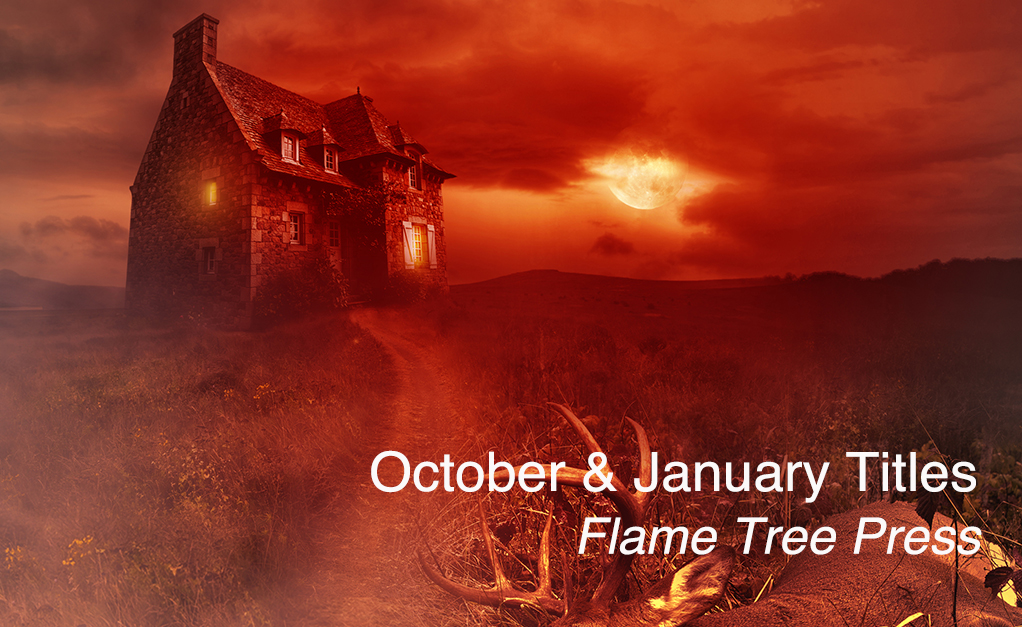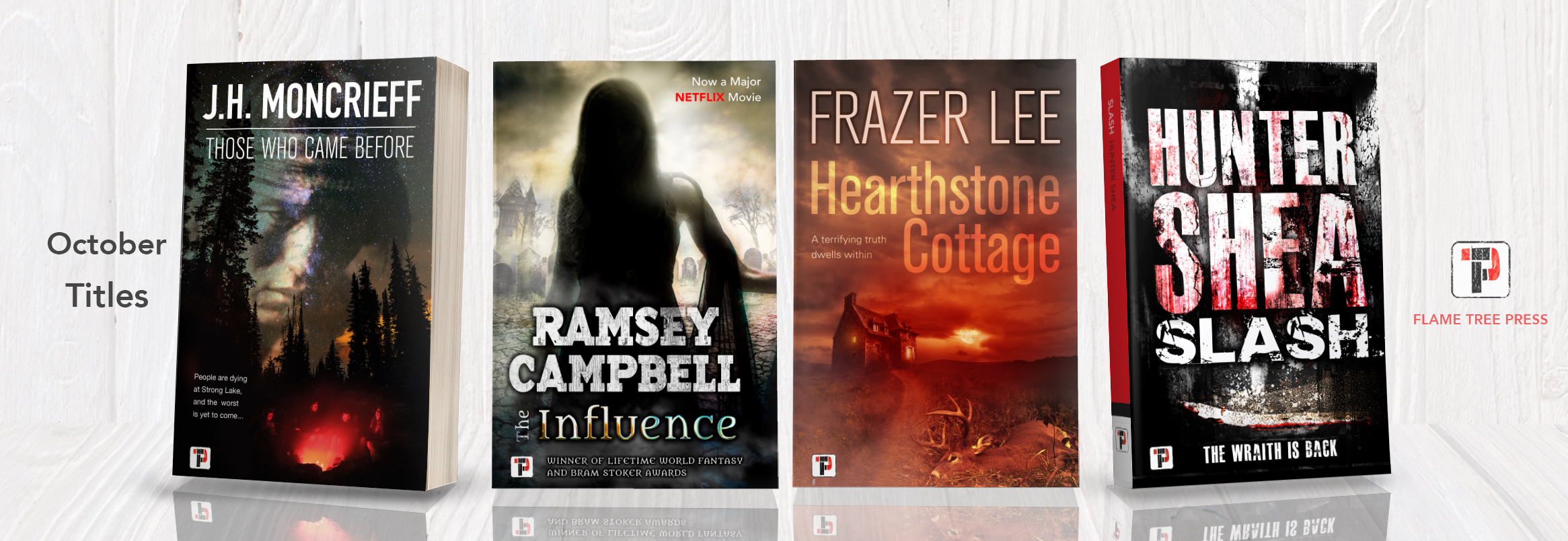
Thirteenth Issue! Spooky Gravity
Welcome to the thirteenth issue of the FLAME TREE PRESS NEWSLETTER! There's more for you to get stuck into with this month's brand new flash fiction! October brings two great stories, exclusive for subscribers to read for one month. The themes for last month's flash fiction were Zero Gravity Love and Spooky Places!
This month's newsletter features:
- Original Sci-Fi Flash Fiction: Rainbow Pod by K.J. Bailey
- Original Horror Flash Fiction: The Village is Closed by Wendy Nikel
- FLAME TREE PRESS - October Releases and Author Q&As
Original Science Fiction Story
Rainbow Pod
K.J. Bailey
Franny snapped her favorite wrench into its custom cushioned notch, making sure it was nestled in so it wouldn’t float away. She ran one hand over the engine compartment as she walked toward the stairs, smiling with satisfaction at her part in keeping the congregation’s ship running. She wasn’t the lead mechanic, but she knew they’d still be stranded in that awful moon-base mechanic shop without her.
When she reached her two-meter-square bunk room, Laura was already there for their daily devotionals. Franny buckled herself into her seat and tilted her head against her best friend’s shoulder with a contented sigh. They were supposed to be studying the Gospel of Luke, but instead of the Bible app appearing on the tablet screen, Laura was scrolling through photos of the fiancés they would meet soon.
“Wait,” Franny said. “You’re going too fast.” She pointed to a photo. “That’s yours, right?”
“That’s—yes, and this one is yours. They look a lot alike, don’t they?”
Laura laughed. The sounds always made Franny so happy. They had known each other for five years, since their parents brought them from Earth orbit, and they’d been inseparable from the start. Now that they were old enough and the ship was orbiting Mars they would be paired off with other Post Anglicans to spread the gospel around the solar system — and to birth new devotees.
Laura sighed. “Are you nervous, Franny?”
“About…” she gestured to the tablet. “The wedding night?”
“Yeah.” Laura’s reply was heavy with tension.
Her hand rested on the tablet, and Franny reached across her lap to squeeze it. Her skin was so soft.
Laura sighed and leaned harder into Franny. Franny felt a wave of affection for her friend stronger than anything she’d felt before. It didn’t seem so odd when their lips, already so close, gently pressed together.
Franny kissed a boy once — the son of a visiting elder — but this was so different. So much better. The boy had darted his tongue in and out of her mouth like some kind of lizard. But Laura was tender and slow with her kisses, exploring Franny’s mouth with her tongue, then sucking on her lower lip.
Franny had never felt a hint of excitement about going to bed with her husband. While the other girls giggled and blushed during Marriage Mechanics class, Laura and Franny made each other laugh by pretending to puke. Kissing Laura made her feel the opposite of nauseated — it was the happiest she’d ever been.
“Franny!” The girls lurched apart. Her mother had burst in without knocking. Now she floated there, opening and closing. But she pulled herself toward the door and left without speaking.
Franny could predict what would happen next just as easily as she could recite the 23rd Psalm: her mother would tell her father, and her father would tell Elder Thomas.
Something floated into Franny’s vision: a droplet of clear liquid, refraction creating a rainbow in it. A tear.
“I better go,” Laura said, unbuckling.
“No. It’ll be ok.” Franny shrugged, not really believing her own words.
Laura shook her head, wiped her eyes. She floated to the door and looked both ways before ducking out.
Franny closed her eyes and thought back to the kiss, then to holding hands, and backwards through their years of friendship. She knew now she could not live without Laura. The stories she had read about romance and love — carefully curated by her mother to avoid any explicit sex —had always felt like they were written for someone else. Now she knew why. Despite years of being told it was the worst sin, that it was the reason the earth was now uninhabitable, she was in love with a woman.
She pressed the tablet’s fingerprint sensor, half expecting her account to be locked. But she was able to open her browser. She had an idea.
She scanned internet sites until her access was cut off. It was mealtime and when she knew the rest of the congregation would be in mess, she left her room for the last time.
She knew the engine room and its emergency pod like a second home. In minutes she’d disabled the alarms and started the emergency sequence, then she activated her com.
“Franny?” came a shaky reply from Laura’s room.
“Meet me in the engine room. I’m watching the hallways. The coast is clear.”
“What?”
“Trust me.”
It was only a minute before her friend arrived. In the meantime, Franny had opened the sealed door to the pod.
“Franny? What’s happening?”
“We can do it, Laura. We can leave and be together.”
When she powered up the pod, alarms started blaring.
“Come with me,” she said. “Before it’s too late.”
“I —”
Thomas’ voice carried down the passageway. “Franny! Laura!” He came around the corner, face stern. “You don’t want to do this.”
“Please,” Franny reached a hand to Laura. “Stay and get married.” Laura cringed. “Or come and we’ll find our way together. We can do it. Trust me.”
Franny could hear the pod’s smooth humming. She had given it a tune-up just a week ago and knew it would get them to the San Francisco. She’d read about the ship, a haven for people like her and Laura, who couldn’t fit themselves into the post-conflagration repopulate-the-species program. She’d read that “gender norms” could be questioned there. She wasn’t precisely sure what that meant but she knew that she and Laura would be ok there. And that the SF could use someone with Franny’s mechanical skills.
Laura didn’t look back. When they rocketed away from the ship, a spray of condensation created a rainbow across the front window. Thomas said the deviants had tried to steal the rainbow as their own symbol, tainting its original meaning as a promise from God. But the rainbow made Franny smile, and when she looked over, Laura was smiling too.
K.J. Bailey lives in the Midwest with three kids, two dogs, and one husband. When she's not hiking or writing, she's planning her next hike. This is her second fiction publication. Her first non-fiction book, A hiking guide, was released in 2018. Her favorite speculative authors include W.P. Kinsella, Neal Stephenson and Dan Wells.
Original Horror Story
The Village is Closed
Wendy Nikel
The village is closed.
The dense woods are owned by an organization with no website, no email address, no phone. The plot maps at the state building show a large rectangle and the simple words, "Village of a Hundred Steps."
The rest of its records are missing. In the county record book, only the ragged inside edges of pages remain – a wound where once a village lay.
There's no longer a path at the edge of the forest, though presumably at one point there was. Presumably, the people of the village once came and went as they pleased, walking to neighboring villages to share news and see old friends, dragging carts to trade goods and barter wares, and perhaps – when whatever happened to them happened, they tried to run to get help.
But if there were once footsteps that beat out a path amid the cedars and aspen and pine, or tracks of wagons and carts furrowed into long, winding lines, their marks are long gone now, filled in by vegetation like Sleeping Beauty's castle, washed away by rain and wind and time.
"THE VILLAGE IS CLOSED."
The sign is strung between two trees. The knots, though hastily bound, have loosened but have not fallen. The ropes have frayed but have not split. The letters are legible but oddly shaped. The "E" is backwards, looping in the middle, like a three. "I"s are ones. The "O" is a zero. The "S" is flat-topped like a five. They are faded, but the paint strokes remain.
A steeple still pierces the sky, its neck raised proudly above the overgrown oaks, an arrow pointing heavenward through the leaves. And slowly, other buildings emerge from the brambles: houses, shops, barns, shyly peering out from behind the branches of bygone years. Their walls have crumbled, their once-cheery paint cracked, their floorboards sagged and threatening to fall in. It's only the structures made of stone that still stand stout and firm and unmoving: the church, the town hall, and a steep set of stairs leading from the village center to the river below.
Within the village, dusty windows stare like eyes, and birds have built ragged nests in the corners of their sills. The doors are unlocked, unlatched, unbroken, but inside is silent and stale. Inside, it is dark and there are scars on the walls – tally marks like a set of fingernails scraping out four lines, with a thumbnail drawn across their middles. Over and over, they add up, multiply exponentially, growing thicker and darker farther from the door. They lead to a corner in a closet in a bedroom – a tiny, dark space hidden away from the world. Hidden away from whatever might be chasing.
And in that corner, something sits. Something – no, someone – sat. They sat long ago and never stood again. Instead, they surrounded themselves with tally marks until their nails broke and bled, leaving tracts of rust-brown streaks on the walls. They sat, their knees against their chest, and what's left of them remains there to this day.
All across the village these grim tableaus are scattered. Bodies, skeletons, decomposed remains, huddled in corners and pressed against walls, their heads bowed and hands clutched as if in prayer. And all around them are numbers. Tallies. Scribbles. Dried-up beans in rows of ten. Numbers, endless and repeating.
The numbers are scattered like breadcrumb trails, crossing and converging at the crumbling well in the center of town. Its stones are dry, and its depths echo with the vast emptiness and futility of something that has failed in its only purpose. Beyond it, the numbers lead to the edge of the stone staircase, where the land dips sharply down to the rushing, running waters of the spring.
The steps are made of flat, white stone that are unlike any found naturally around here, with strangely hypnotic silvery swirls that appear to be almost in motion. They are somewhat too narrow… or perhaps somewhat too wide… or somehow, simultaneously both. They're sloped too far uphill… pitch too far downhill… and are yet somehow perfectly aligned.
Upon the very top one is the warning: "Don't count!"
Don't count the steps? One… two… three… Don't count…
The warning is wise but impossible to follow, for the stones themselves seem to sing out their numbers. Eleven… twelve… thirteen… Don't count…
There's no turning back. The steps, once climbed, can't be un-climbed. Once descended, can't be un-descended. The numbers, once counted, can't be un-counted. The numbers have been called up, like a spell. Like a prayer. They are stuck in endless progression, though perhaps, with the final step, they'd die away like an earworm that finally fades upon the song's completion.
But the end doesn't come. The numbers reach, then surpass a hundred. Then a thousand. Then ten thousand more. Then it's clear that the river will always be just beyond, that there's no reaching it, at least not by these steps, and the only solution is to turn around.
But the village is closed. It's caught in the loop and doubles round on itself like a symbol of the infinite. As the numbers swirl through the air and scream through the fast-approaching night and splinter the boards upon each building, each path leads right back to the well. Each wall and floorboard echoes in time with the church-steeple bell, gonging at each count.
Twenty-six-thousand, four-hundred thirty-two… Twenty-six-thousand, four-hundred thirty-three…
There's nowhere to flee and nothing left here – nothing but endless numbers.
The village is closed.
Wendy Nikel is a speculative fiction author with a degree in elementary education, a fondness for road trips, and a terrible habit of forgetting where she's left her cup of tea. Her short fiction has been published by Analog, Nature: Futures, Podcastle, and elsewhere. Her time travel novella series, beginning with The Continuum, is available from World Weaver Press. For more info, visit wendynikel.com
FLAME TREE PRESS | October Releases
We are extremely excited to be announcing our upcoming October titles. We've gone horror crazy and rightly so! Hunter Shea's latest Horror Slash is a loving tribute to slasher movies like Friday the 13th, J.H. Moncrieff has a brand new horror called Those Who Came Before...there are some deaths by a lake and an exciting supernatural twist, next up is a gripping English horror story from Bram Stoker Award Finalist Frazer Lee called Hearthstone Cottage and lastly we have The Influence, a new-to-Flame-Tree title by horror legend Ramsey Campbell, which has very excitingly been made into a Netflix film and is out on the 11th of October, so don't forget to watch that one. See the link to the film here.
Those Who Came Before by J.H. Moncrieff, The Influence by Ramsey Campbell, Hearthstone Cottage by Frazer Lee and Slash by Hunter Shea
Other Newsletters!
Sign up for future Newsletters and receive special offers, themes for entering our flash fiction competition and pre-publication information.



 Sign up for our fiction newsletter
Sign up for our fiction newsletter 